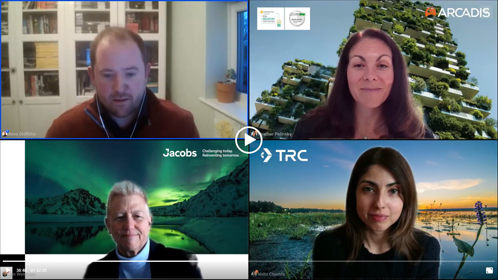
The uptick in regulatory changes and developments related to climate and environment reporting and disclosure (particularly in the US) is driving an exponential growth in the number of companies engaging with ESG and climate risk requirements.
At Environment Analyst's webinar on 12 January, which covered findings from our US environmental & sustainability consulting market assessment, a panel of senior business leaders offered perspectives on the growth in demand for ESG related services, and the effect this is having on both the sector and their businesses.
The panellists shared insights into how their firms are responding to changing market dynamics, how they need to continue adapting to remain competitive, and how they are helping their clients to do the same.
The discussion highlighted a trend towards focusing on positive impact and purpose-led business models for the environmental & sustainability consulting sector. Integral to this is the need to shift the collective mindset within companies (and individuals) so as to effectively integrate ESG and sustainability objectives into corporate culture, and indeed into all aspects of project planning — right from the beginning.
"A critical aspect of our current strategy," said Heather Polinsky, global president, resilience, at Arcadis, "is to implement sustainability considerations early in the project planning phase, from a delivery perspective — at the project team level, rather than being considered separately and then integrated later."
Training and upskilling
"We are responding to our clients' shifting mindset and as a result we are training and upskilling all of our staff within Arcadis," Polinsky continued. "As an industry this is a call to action, to be bolder, to be more present, in order to be able to provide solutions for the issues that are having the biggest impact on our world."
Many companies are stepping up in-house training and upskilling initiatives. For example, Arcadis plans to provide sustainability training for all 36,000 staff members in 2023 and Burns & McDonnell have developed a climate literacy programme for all its professionals.
All firms are finding a major obstacle is accessing the future workforce needed to meet the demands of a rapidly evolving and growing industry. Environment Analyst's global market forecasts indicate that the E&S consulting sector needs to recruit an additional 75,000 consultants between 2020 and 2025 to deliver expected market growth, with 24,000 of those coming from the US.
Panellists agreed that the labour market remains very tight, characterised by upwardly spiralling salary costs and a dearth of new staff with the required knowledge and competencies. Companies are exploring various strategies to address this challenge.
One approach cited by several is the use of digitalisation to increase productivity, by developing and integrating machine learning and AI solutions to pick up the slack. Other solutions include using lateral thinking to pursue new partnerships and collaborations, and identifying untapped talent within the existing workforce and value chain, and then offering targeted, certificate-level training.
All the market leaders espoused the future benefits of "profession promoting" at a much earlier stage, in schools and colleges, to foster awareness and a clear career pathway for young learners. (This is one of the ambitions of Environment Analyst's Early Career Advisory Board delivered through the Sustainability Delivery Group.)
Shifting the mindset
Jan Walstrom, senior vice president global climate response at Jacobs asked: "How do we rescale and upskill our employees at all levels, in all capacities, and competencies within our businesses, so that every staff member actually understands and embraces what ESG and sustainability mean? How does it relate specifically to what they're doing on a daily basis? And how do they need to infuse it into their thinking, solution development and delivery across all of their projects?"
"We start seeing the confluence of climate, nature, social value, social equity, and social justice, interfacing and integrating with each other."
"That's where we start seeing the confluence of climate, nature, social value, social equity, and social justice, interfacing and integrating with each other, and being a foundational element of how we think about building solutions across all of the domains of our expertise, extending into all of the markets that Jacobs serves."
The panellists agreed on the importance of focusing on solutions-based approaches.
Nidhi Chatter, managing director ESG and climate advisory, TRC, said: "We are seeing a lot more focus on solutions-based approaches from a sustainability integration standpoint. Client conversations always point to a cross-functional approach."
In addition, market leaders including AECOM, Jacobs, and Burns & McDonnell are setting up ESG risk committees and steering groups at the practitioner level.
Several firms also emphasised the vital need for providing clients with a concrete plan for addressing ESG and sustainability issues, and the further need to demonstrate progress in achieving these goals over time.
Levels of engagement
The language and definition of ESG can vary depending on the company, the person or the industry. It is important, agreed panellists, to be aware that there is not a ‘one size fits all’ definition of ESG, and that every client is coming into projects at different starting points. The goal for environmental & sustainability consultants is "to move clients along at a faster pace than they would otherwise, but to also listen and customise solutions to fit their specific needs," according to one panellist.
ESG factors are relevant across most sectors and business models, and each client will require a customised plan based on their specific needs and goals. Clients are also recognising that ESG and sustainability are not just about environmental considerations, but also include social and governance factors.
"The journey is based on your lived experiences," explained Walstrom. "It's different talking to a wastewater treatment operator than it is to a CEO, or a CFO. For us, it's important to understand how people relate to ESG, and then to engage with them from a standpoint that they can understand."
Panellists made one final point about the positive side to the public debate about the value of ESG.
"Frankly, all this public talk about ESG is giving us extra airtime as an industry. This is a chance for us to dispel some of those myths that are surfacing."
Panellists at the Environment Analyst US market webinar
Watch the webinar on-demand
Global Environment Analyst members can watch the webinar and download the presentation slides here.
Members can also download the full 75 US Market Assessment here.
If you are not a member and would like to discuss membership options, please contact lisa.turner@environment-analyst.com
Continue the conversation at the Global Business Summit
Join environmental and sustainability consulting leaders, clients and stakeholders at Environment Analyst Global Business Summit (27-28 June, Chicago) and continue the conversation on how sustainability and ESG drivers are impacting the environmental and sustainability consulting market, and how to leverage these to achieve net zero goals.

